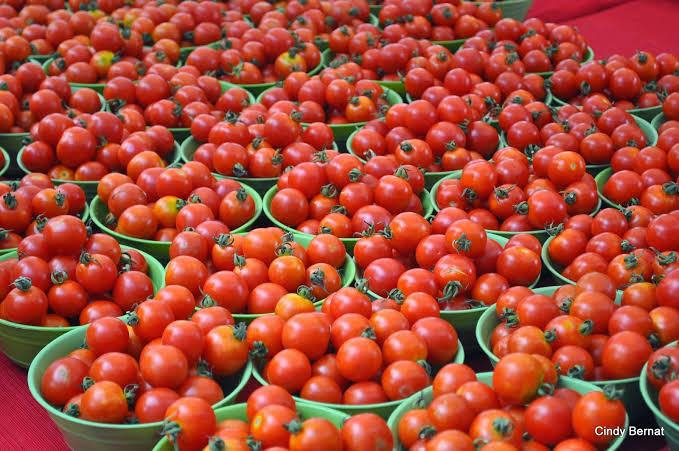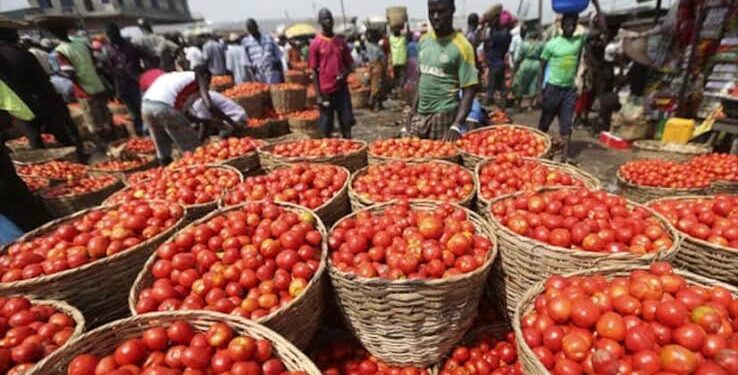Traders at the bustling Ketu and Berger markets in Lagos shared with reporters that the price of tomatoes has significantly dropped due to an influx of new produce. According to a trader at Ketu market, a big basket of tomatoes now costs between 55,000 to 60,000 naira, which is a significant decrease from the average price of 150,000 naira just a few months ago.
Moreover, a box of tomatoes that previously went for 55,000 naira now sells for 30,000 naira. He said a big basket of habanero chilli peppers (rodo) was selling for 55,000 naira at the peak of the price hike but now sells for an average of 25,000 naira.
“The season is here.” The trader cited the reason for the drop, saying “Hausa tomatoes and peppers are already in the market.”

Another trader at Ketu market said a small basket of tomatoes now costs between 20,000 and 25,000 naira, down from its previous price range of 30,000 to 34,000 naira. She also said a small bag of pepper now sells for about 15,000 to 20,000 naira. It used to cost 50,000 naira.
Traders at Berger market told reporters that a big basket of tomatoes has dropped to about 50,000 to 60,000 naira from 150,000 to 200,000 naira. They added that the price of a box of the commodity has dropped from 35,000 naira to 15,000 naira. Traders said that in the same market, the largest bag of habanero peppers is now selling for N19,500, down from N200,000 to N230,000.
The price of a medium bag has dropped from N130,000 to N17,500.
A trader said the price of a large bowl of cayenne peppers (bawa), called gomu, is now between N8,000 and N9,000, a significant drop from its previous price of N28,000.
“It is because of the season and then, petrol. There is petrol to transport tomatoes,” a trader said on the reason for the price drop. A trader named Muhammed at Dutse market in Abuja said a basket of tomatoes now sells for 8,000 naira, down from the previous price of 13,000 to 15,000 naira.
He added that consumers can now buy red chilli (tatashe) for 7,500 naira instead of the previous 12,000 naira. The price of habanero pepper has dropped from 13,000 naira to 15,000 naira to 9,000 naira.
Muhammed said that cayenne pepper now costs 8,000 naira at Dutse market compared to 12,000 naira earlier.

Like his Lagos trader, Muhammed also attributed the drop in prices to the seasonal availability of the commodity.
“Sometimes the price goes up and sometimes it comes down. We sell based on how we buy,” said the dealer.
“If you come tomorrow, the price might go up or down. It changes unexpectedly.”
Another trader, Musa, said there is now ample supply in the market, unlike the previous shortage.
“Prices are expected to stabilize from August to November.”
The price of tomatoes has risen significantly in the Nigerian market in recent months.
On May 30, the Nigerian Tomato Growers Association announced that the price hike was due to the destruction of tomatoes in northern farms by “Tuta absoluta.” Tuta absoluta, also known as the tomato leafminer, is a type of moth in the Gelechiidae family.
According to research publications, the pest attacks tomatoes in Europe, Africa, West Asia, and Central and South America, where the larvae cause up to 100 percent damage if not effectively controlled. Rabiu Zuntu, chairman of the association in Kaduna state, said supplies were running short due to the infestation.
According to the National Bureau of Statistics (NBS), prices of tomatoes, garri, and other food items increased by 55 percent in June.
Sani Danladi, national chairman of the Tomato Growers, Processors and Marketers Association of Nigeria, told Journalists that prices have started to fall due to the start of cultivation of the new crop. “The current price for a big basket of tomatoes is somewhere around N25,000-N30,000. Before, it was about N80,000-N90,000. It has reduced by 60 percent,” Danladi said.
“The reason why the prices dropped is because of the new harvest, new production. The wet season production has started coming out.”
Danladi added that prices are expected to stabilize from the end of August to October and November, making tomatoes more affordable.

































